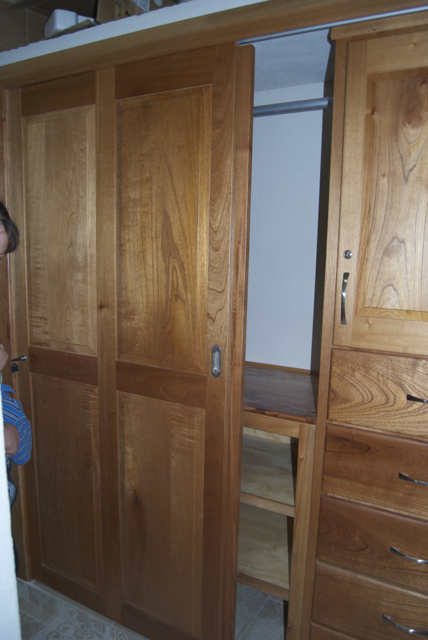Advice for a Young Woodworker Starting Out
Feedback from the old-timers for an ambitious youngster. September 17, 2014
Question (WOODWEB Member) :
I'm eighteen years old and I have been working with wood for several years now. Recently I've started making furniture as a business. I've been able to get jobs and referrals but I see the need to grow and gain more knowledge. I'm trying to find a master woodworker who does high quality woodwork - cabinetmaking, architectural woodwork, maybe furniture as well. Who would be willing to take me on? I'm willing to work hard and I'd be willing to practically work for room and board. Would you know of anyone who might be willing??
Forum Responses
(Business and Management Forum)
From contributor R:
Get ready to work in a shop for $9.00 an hour as a machinery operator. Skills you will learn will include running a shaper all day long. I know a guy that ran a moulder for 25 years - fun stuff. After 15 years you might move up to a foreman level position and earn the equivalent of $15-20 per hour today. Youíre lucky to get to work or learn from a master craftsman, even more so to find one that can offer you a career path. How much money do you need to earn to live comfortably? Think about how youíre going to earn $40k plus in this line of work. It isnít easy, and you better be prepared to work long hard days in a loud/dusty environment. Woodworking calls many and chooses few. 1-1000 people who are in your position will find a job with a furniture maker. 1-1000 who dream of going out on their own will be successful.
Your best bet would be finding work with a small/high end cabinet shop. Small enough that skills/knowledge are valued. Large enough that they can pay ok, and offer opportunities to work your way up. Not large enough that youíre going to be stuck running a shaper 9-5 for $8-12 per hour, until you get tired and quit. If you want a career then installation & high end finish carpentry are where itís at. This is the trade to learn. No shop/overhead and youíll be in high demand if youíre good. You still get to do awesome woodwork and do things with portable tools that would make most of the guys here jealous. This gets you out of the shop and in the field where you can network with other trades/contractors. This is how you build a foundation and open a small cabinet shop down the road.
From contributor R:
Furthermore, due to labor laws apprenticeships have all but disappeared due to labor laws/insurance, workers comp, and increased cost of living. As a woodwork professional, I frequently have enthusiastic people offer to work for room and board, or no pay. I generally have to explain that this type of arrangement would be illegal, and could land a business owner in serious trouble. Even for minimum wage, the true cost of hiring an employee is often 50 plus percent more than their hourly wage when you factor in workers comp, unemployment taxes, benefits, and other expenses. This makes the traditional apprenticeship model or working for room and board to get your foot in the door difficult or impossible. There are certainly opportunities out there in the form of internships (check with woodworking/boat building schools) however those positions are very competitive and they may only last for six months to a year at the most.
From contributor S:
You are doing the right thing by asking questions up front. You should go to shops in your vicinity and tell them what you are looking for and your interests. There are so many guys simply looking for a job that they should take an interest in someone who actually wants to be a craftsman. Choose a smallish shop that does the variety of things as you described that is well equipped and has veteran people working there. That should give you a chance to learn all the aspects that they do at that shop. Most shops stick with one type thing, kitchens, commercial, laminate, millwork, etc. A millwork shop or exhibit shop provides a lot of variety.
Do the homework of reading about the machines, tooling, cutting tools and learn autoCAD. After a few years you could be ready for your own thing. Learn the fundamentals! Most guys tell you they have been doing this for ten years and they know everything yet can't tell you what a rip blade looks like and can't glue up anything without it looking like a potato chip in a couple days. At our shop we have about 50 folks, a few are very skilled, the rest have jobs and will never choose to learn too much, get in a rut, leave if anything else comes up that gives them another dollar and that's ok too, they just don't look at it the way you do. Read here and you find some very happy folks doing pretty cool things. Stay focused and find the right place for your long term vision, don't let yourself get stuck at that moulder. You are thinking correctly, are developing your plan. You are already miles ahead of most.
From contributor S:
I should add, if you intend to run your own shop it wouldn't hurt to take some business courses unless you become part of the management team where you go. It's one thing to be a craftsman and build cool stuff, another to have security and keep the doors open.
From Contributor O:
When I was in your shoes I heard much the same story as Contributor R relates. Cynical, but mostly accurate. At the time, Fine Woodworking was just introducing the world of well-crafted work to both makers and consumers, but what a dream. Then I realized that someone had to be the guy that lands a dream job, and then is prepared to make a living working wood. I only needed one job - no matter that 16,000 woodworking jobs were boring and tedious. I just needed one.
I found employment at an established architectural shop full of old men. We built louver operable shutters, wall panels, doors, columns, mantels and curved staircases as well custom stair parts. One other guy in his 20's and we did all the grunt work, but also built the curved stairs. Everything I read was about wood, design, architecture or similar fields. Vacations were to historic houses. I soaked up everything.
The pay and conditions were terrible - medieval in fact. But I learned all I could about solid wood joinery and fabrication. No particle board or staples in the shop. After nine years, I moved to another shop, ran it for three years, then to a another, ran it for five years, then out on my own for the last 23 years. It is not easy. It is also a lifestyle more than a career. It is, however, the only way I can work. Job satisfaction is off the charts, but I have grown used to it. I have turned down real jobs and partnerships, since they cannot offer the same security that I have with my shop, my hands, and my experience. My point is that someone has to be the one that makes it - why not you? Work for minimum wage and live simply while you gather all that you can.
From the original questioner:
I understand a little about what you say. I think I understand how difficult it will be. Having said that, I already know a little. I've studied books. I know to a certain extent how to use the table saw, routers, bandsaw, etc. I've learned how to cut joinery by hand as well as with machines. I've built doors, one closet, tables, chairs, boxes and I've turned some things as well. I could pretty much make most things but, as you all say, it takes years to make a master. I really struggle with efficiency and speed. I also am at a loss when trying to build architectural woodworking as I don't know how to cope with the different challenges of flaws in the construction if you understand what I mean. Would any of you know of anyone in the Lincoln NE area that is really good?
From contributor S:
Try Des Moines Area Community College, Arch. Millwork, for leads on shops. They probably will try to get you to enroll, but you might be able to pull some contacts out.
From contributor I:
I came in about the same time as David. I spent 15 years making furniture as a part time business while working a mechanical design day job. I kept my day job and honed my skills and built a customer base. I opened my own shop and operated it for eight years. I was burnt out in that short time with 60 hour weeks as normal, 80 were usual. Found out I was way better at woodworking than business. I closed up to get a woodworking magazine job and that only lasted three years before they closed. I lucked into a modelmaker job at the place I had worked at the first 15 years and even picked my seniority back up.
Here's how I would do it today. I'd still start out part time. Mess up a quote, you still can buy groceries. Get married to a professional woman with great job benefits. Someone with enough money and benefits so that both of you can live without the woodworking making a profit. Live in an area with great high end tourist traffic. Stay a one man shop, but build product the tourists buy, and if they don't, spend the day on the beach while your wife brings home the money. Really, that wife deal makes a woodworking career so much easier. (Except the times when she has had enough of you not bringing home enough money.) If mine had not been working, I would not have made it that eight years. Oh yeah, get a Lab/Golden Retriever as a shop dog. I wouldn't work without one. They are great company that will still give you a lick after a horrible day. And if the wife doesn't like you coming home dirty and losing money again, the dog will still love you!
From contributor Y:
I second Contributor Iís comment on the dog. I have a lab retriever and she is the best companion in the office/shop. At 18 I went to college for woodworking and started for min wage sanding in the finishing area. It was a small millwork shop where I was trained and given every experience necessary to excel. Fast forward to today, I am 35 and have my own millwork shop with CNC and six full time employees. It can be done but don't go in expecting things. I never knew I would get here. I remember dreaming I could have a bench of my own and build the amazing things I was helping with at the time. Go slow, do anything if you are good you will move forward, do not ask or have expectations.
From contributor P:
There are shops where workers make a good wage with benefits, do interesting work, and get along with each other. Unfortunately, that isn't the norm, but it's not unheard of either. I would suggest that the next best step for you is to find one like this and work there for a while. Starting your own place involves a lot of other skills besides woodworking, and a certain element of luck. Good shops are always looking for good workers. If you can find the right situation, it's a good place to grow and work your way up to more responsibility. You will also get a chance to see how a successful owner operates a business.
Don't let the negativity in this thread keep you from trying to do something you love. I started my own shop 27 years ago, without benefit of any training whatsoever, and have made it into something I am very proud of, but there was a lot of luck along the way. In hindsight I would have benefitted greatly from a few years working for someone else - it would have saved me from a lot of very basic mistakes. Last thing: if you are a careful enough writer to use whom correctly, you are probably a good craftsman as well. Good luck!
From the original questioner:
Thank you guys, I appreciate the advice and comments. I appreciate the leads as well. Thank you for the encouragement Contributor P. I'll try to find a shop that will prove to be a great learning experience, hopefully for better and not for worse.
From contributor A:
Well some good responses here and much truth in the long journey to a livable wage but the industry is changing. The technology that the metal working industry has enjoyed for decades has finally started to become commonplace in the woodworking industry. Forget working for the small shops ,they usually cannot afford anything and are usually stuck in the thought that if it worked 20 years ago there is nothing wrong with it today and complain that the cost of labor is keeping their profit down. Find a larger shop with 50 or more employees and take a tour. For me looking at what machinery they have on the floor tells a large story. Are they well set with late model equipment? Is their edgebander a toy or a heavy production machine? Do they pay machine operators well? Look in the parking lot, does the crew drive late models or are bald tires, jumper cables and old beaters the normal?
Try and check and see what design software they are using, can they afford to keep up or are they still scratching out cutlists on scrap paper? The $9.00 an hour starting wage is unrealistic, they offer that and then complain that they have trouble with employees not showing up or a high turn-over, well duh! Remember, you are investing your time as well and when you have soaked up the knowledge and the raises stop it is time to move to another ladder that has more rungs to move up to. Loyalty goes both directions.
From contributor D:
I think your best bet is to enroll yourself in the best woodworking furniture program possible - College of the Redwoods as an example. Todayís shop computer operators to program and run the CNCís and such, a different skill set than building, yet valuable .
Once in a program or trade school offers will be made available to the right people for future employment B usiness classes will be helpful but honing your other skills can be done while learning. A pal of mine gets the names of up and coming students wishing to pursue the industry and in fact most all of his new hires come from the school. Todayís shops can't in most cases afford to teach and train too much. If a shop pays you even min wage they have to pay another at 50% , so to make any money on you as a self-described person who wants to learn to be more efficient and have a better understanding of the machinery involved you would need to be profitable for the shop. Having experience along with knowledge will make you more desirable to employ.
From the original questioner:
I'm taking in what you all say. Sometimes it is hard to agree with everyone but I am trying to weigh your advice. I had at one time thought of going to the Thaddeus Stevens School of Technology. I didn't think I would learn a lot but I may have been wrong about that. I think I'll try to get a job somewhere and if that doesn't work out maybe I'll think about enrolling in a school.
From contributor P:
I currently have three workers who went to Thaddeus Stevens - my impression of the program is that it is a little heavier on traditional skills than I use in my shop, but that the teaching and the overall education is excellent. There are a large number of woodworking establishments in the area, so their employees seem to have good prospects. My own opinion is that, if you are paying someone to teach you about woodworking, that the program should include 21st century manufacturing techniques - CNC, and use of design software for CAD and modeling. I'm not familiar with the curriculum at the College of the Redwoods, but I did read Krenov's books when I was just starting out and, while I loved the message, they paint an extremely unrealistic picture of how one might make a living as a craftsman.
From the original questioner:
About College of the Redwoods and other ®Fine® woodworking schools; a teacher at Thaddeus told me that people from the North Bennet Street School had a hard time finding jobs in the Lancaster area as they were known as diamond cutters. I think that would be a reputation of those types of schools. Below are some pictures of things Iīve built so as to show what level Iím at, or not at. It is nothing fancy compared to what a lot of you guys do but here they are.

Click here for higher quality, full size image

Click here for higher quality, full size image

Click here for higher quality, full size image

Click here for higher quality, full size image

Click here for higher quality, full size image

Click here for higher quality, full size image
From contributor I:
I visited College of the Redwoods and took a weekend design class with Krenov. Wonderful experience, but got the idea that you would have to be able to ship your work into a major metropolitan area to make a living with that work. A lot of those students go on to teach want-to-be weekend furniture makers to supplement their incomes. Not sure if they added business classes to the furniture making or not since Krenov died.
From contributor J:
My simple opinion is that you will do well no matter which choice you make purely by the fact that youíre on this site seeking wisdom from those in the trade. I'm only 27 and run my own business doing custom work in the residential and commercial market. It would behoove of you to gain a diverse knowledge over the next five years. Work in a custom cabinet shop, furniture maker, doors, windows, millwork, finish work and etc. The list goes on so find your interest and run with it. Each experience will direct the next experience. Also start taking a work journal daily with notes, drawings, and photos so you can ingrain the knowledge learned and have a future reference. Youíre in a great position and I envy your early ambition and direction.





